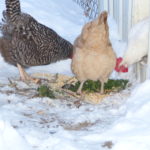An outdoor run gives chickens more than fresh air and a place to exercise. Delicious tidbits are waiting to be discovered outside and break the monotony of daily mash or pellet meals.
Hens find food in even the smallest runs. Unfortunately, they quickly consume green grass yet still find earthworms and grubs while scratching. Occasionally they’ll even snatch a fly from the air, and if they can run down and catch a wandering mouse they’ll soon convert it to high protein food. At Winding Pathways our run is enormous, so our chickens enjoy greenery and insects all summer.
When the ground freezes and the snow flies the run remains a place for exercise, sunshine, and fresh air but there’s not much to eat there. Chickens are forced to dine on the same commercial mash day after day. It meets their nutritional needs but is boring!

Chickens love treats.
We jazz up their diet with tasty snacks from our kitchen and mealworms.
Fortunately, chickens, like most humans, are omnivores and enjoy a diversity of food. They love most table scraps. On a cold winter morning a handful of leftover bread, pizza crust, salad bits, and meat or fish scraps is enthusiastically devoured.
We accumulate kitchen scraps in a small stainless-steel seamless bucket that’s easy to clean. Each morning we carry it outside. As soon as the hens see one of us carrying the bucket, they run toward us. Our compost bin is immediately outside the chicken run, making it easy to toss the foods chickens will eat into the run and drop the rest in the composter. Generally vegetable and fruit peels get composted while the rest goes into the run. Some people smash eggshells and give them to chickens, but we prefer composting them. By spring our composter has transformed the scraps we don’t give to chickens and decomposing coop litter into outstanding compost for the garden. At Winding Pathways everything organic is used and most is returned to the soil.
Every afternoon our hens get a special treat – a scoop of mealworms. They absolutely love them, and we use them to help manage the flock.
According to Cesar, Director of Marketing at Mealworms By the Pound, mealworms are an ideal chicken food supplement. Nearly all dried mealworms are produced in China. “They keep about two years as long as they’re stored in a sealed container,” he said.
We bought a 30-pound bag of the dried bug larvae in the fall. They’re expensive so we feed them sparingly as a special treat. We store the mealworms in a metal trash can with a tight-fitting lid and give the hens a small scoop every day. Thirty pounds last all winter. Small bags of dried mealworms can be bought in most stores that sell chicken feed or ordered online.
Our hens love them so much that they come running when we announce, “MEALWORM TIME!” with a husky voice. That’s especially helpful during afternoons when we want to close the pop hole door before sunset. We simply yell “MEALWORM TIME!”, scatter worms inside the coop, and close the pop hole door as soon as all the girls enter.
People tire of monotonous food served every day, and so do chickens. Commercial mash is an outstanding feed but giving hens special treats livens up their day.

